G.G. Sohani, J.@mdashBy this reference u/s 256(1) of the Income Tax Act, 1961 (hereinafter referred to as "the Act"), the Income Tax Appellate Tribunal, Indore Bench, has referred the following questions of law to this court for its opinion ;
"(1) Whether, on the facts and in the circumstances of the case, the Tribunal was right in not allowing the assessee to claim the deduction of the cost of the asset to the donor, while computing the capital gains on the property sold under sections 48 and 49 of the Income Tax Act, 1961 ?
(2) Whether the Tribunal was right in holding that the assessee was not entitled to change her option for deduction of value/cost for computation of capital gains from Section 55(2)(ii) to Section 49, when both the claims were made in the return itself ?"
2. The material facts giving rise to this reference, briefly, are as follows :
3. The assessee is assessed in the status of an individual. In the return filed by the assessee for the assessment year 1979-80, the assessee disclosed that a house which was received in gift and was purchased by the donor for a sum of Rs. 1,65,000 was sold on March 3, 1979, for a sum of Rs. 2,00,000. The assessee claimed deduction of the cost in the computation of the capital gains at Rs. 2,00,000, which, according to the assessee, was the market value of the property on January 1, 1964. During the assessment proceedings, the assessee was asked to explain as to how the market value of the property as on January 1, 1964, was determined by the assessee at Rs. 2,00,000. In reply, it was submitted on behalf of the assessee that the cost of the property to the donor was Rs. 1,65,000 and that the deduction of cost be, therefore, allowed at Rs. 1,65,000 instead of at Rs. 2,00,000 as claimed in the return. The Income Tax Officer, however, held that once the assessee had exercised her option, the assessee could not be allowed to claim that the cost of acquisition in relation to the capital asset in question be taken to be the cost of acquisition to the donor. The Income Tax Officer then computed the income chargeable under the head "Capital gains" on the basis that the fair market value of the property in question on January 1, 1964, was Rs. 1,10,000. The appeal preferred by the assessee before the Appellate Assistant Commissioner was dismissed. On further appeal before the Tribunal, the Tribunal held that the assessee, having exercised her option u/s 55(2)(ii) of the Act, could not be allowed to change her option. The Tribunal, accordingly, dismissed the appeal. Aggrieved by the order passed by the Tribunal, the assessee sought reference and it is at the instance of the assessee that the aforesaid questions of law have been referred to this court for its opinion.
4. Shri Chaphekar, learned counsel for the assessee, contended that the provisions of Section 55(2)(ii) of the Act could not be construed to mean that if, in the return, the assessee had claimed deduction of the cost of acquisition of the property for computation of the capital gains on the basis of the market value of the asset as on January 1, 1964, the assessee was precluded from contending that the cost of asset to the previous owner be taken to be the cost of acquisition. It was urged that the option available to the assessee u/s 55(2)(ii) of the Act could be exercised by the assessee till the income chargeable under the head "Capital gains" was finally computed. In reply, it was contended by Shri Mukati, learned counsel for the Revenue, that once the option was exercised by the assessee, the assessee was bound by the option so exercised.
5. Before we proceed to appreciate the contentions advanced before us, it would be useful to refer to the relevant provisions of the Act. It is common ground that, in the instant case, the cost of acquisition of the property in question for the purpose of computation of the income of the assessee chargeable under the head "Capital gains" has to be determined as provided by Section 49 of the Act, as the capital asset in question had become the property of the assessee by one of the modes specified in Section 49(1) of the Act. Clause (ii) of Sub-section (2) of Section 55 of the Act provides that where the capital asset became the property of the assessee by any of the modes specified in Sub-section (1) of Section 49, and the capital asset became the property of the previous owner before January 1, 1964, the cost of acquisition in relation to that capital asset means the cost of the capital asset to the previous owner or the fair market value of the asset as on January 1, 1964, at the option of the assessee. It is not disputed that the provisions of Clause (ii) of Sub-section (2) of Section 55 of the Act are attracted in the instant case. The short question for consideration is whether the option available to the assessee under Sub-clause (ii) of Section 55(2) of the Act can be exercised by the assessee till the income of the assessee chargeable under the head "Capital gains" is finally computed or whether the assessee is debarred from contending that the cost of acquisition of the capital asset be taken to be the cost of the capital asset to the previous owner, if, in the return, the assessee had claimed deduction of the cost on the basis of the market value of the property as on January 1, 1964.
6. At this stage, it would be instructive to refer to the provisions of Section 3 of the Act, which define "previous year". Sub-section (4) of Section 3 enacts that where, in respect of a particular source of income or in respect of a business or profession newly set up, an assessee has once exercised the option, he shall not, in respect of that source, or, as the case may be, business or profession, be entitled to vary the meaning of the expression "previous year" as then applicable to him, except with the consent of the Income Tax Officer and upon such conditions as the Income Tax Officer may think fit to impose, It is thus clear that, in case where it is intended that the option once exercised by the assessee cannot be subsequently varied by the assessee, the Act has made specific provisions in that behalf. There is no such restriction in Section 55 of the Act. Sub-clause (ii) of Section 55(2) gives an option to the assessee to choose one of the two modes for determining the cost of acquisition of the capital asset in question. The cost of acquisition has to be determined for the purpose of computation of income chargeable under the head "Capital gains", as provided by Section 49 of the Act. It, therefore, follows that the option available to the assessee under Sub-clause (ii) of Section 55(2) of the Act can be exercised till the income chargeable under the head "Capital gains" is computed. The right of choice is conferred on the assessee by Sub-clause (ii) of Section 55(2) of the Act solely for his benefit and unless there is anything in the enactment which curtails the freedom of choice, it would not, in our opinion, be proper to restrict that freedom. The freedom of choice is available to the assessee till the income chargeable under the head "Capital gains" is computed. The Tribunal, in our opinion, was, therefore, not justified in holding that, on the facts and in the circumstances of the case, the assessee could not be allowed to claim that the cost of acquisition for the purpose of computing the income of the assessee under the head "Capital gains" in relation to the capital asset in question be taken to be the cost of the said capital asset to the previous owner, as provided by Sub-clause (ii) of Section 55(2) of the Act.
7. For all these reasons, our answers to the two questions referred to this court by the Tribunal are in the negative and in favour of the assessee. In the circumstances of the case, parties shall bear their own costs of this reference.

